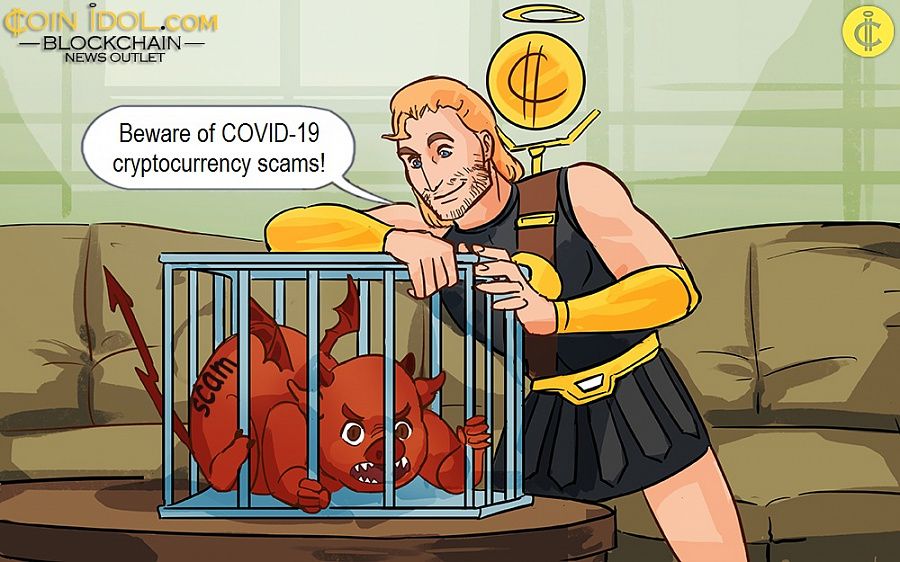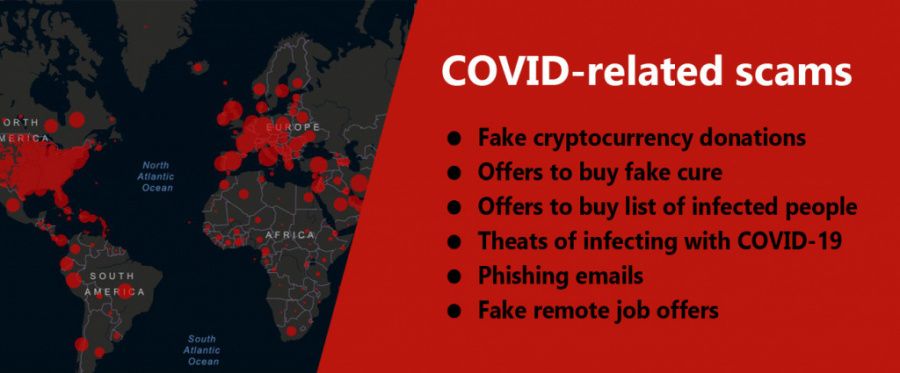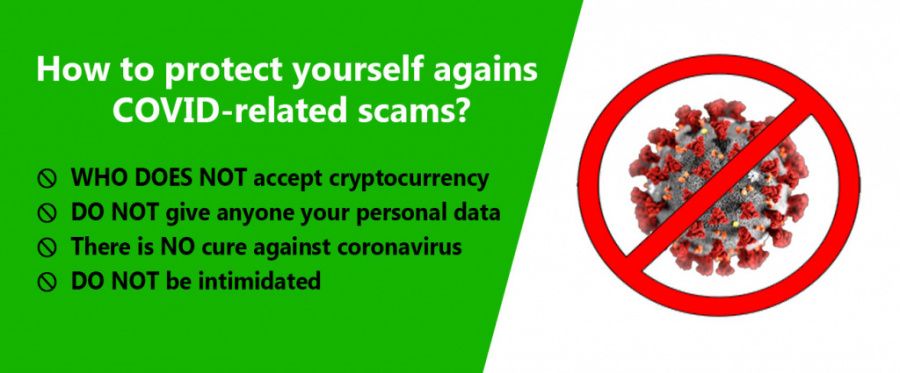5 COVID-Related Cryptocurrency Scams that Can Trick You Out of Your Money
Apr 21, 2020 at 10:55 //
News
While most of the world is in a lockdown due to the COVID-19 pandemic, many people have lost their jobs or sources of income. While searching for a way to improve the situation, it is rather easy to fall victim to a fraudulent scheme.
As the outbreak of the coronavirus has put most of the planet into a lockdown, scammers and fraudsters take their chance to make some profit for themselves. Some of them target critical health departments of governments, non-profit organizations (including WHO), and private firms working hard to curb the COVID-19 pandemic. The World Health Organization (WHO) has in recent weeks registered a rapid hike in the number of hacks, most of which demand ransoms in cryptocurrency.
However, ordinary people suffer no less, and even more, as scammers trick them out of their last money. In conditions when it is not so easy to earn funds, it might be fatal for some families. Coinidol.com, a world blockchain news outlet, has gathered a list of the most widespread scam schemes related to coronavirus, in order to help our readers protect themselves.
Fake cryptocurrency donations
While everybody understands it is important to combat COVID-19 as soon as possible to get back to normal life and prevent global economic collapse, scammers try to benefit from people’s willingness to help. So they pose themselves as reputable organizations such as National Health Service or World Health Organization and ask for cryptocurrency donations to aid the victims of COVID-19, buy drugs and medical equipment or fund the research for a vaccine.
It is easy for fraudsters to trick trusting people as such organizations really collect donations. However, none of them accepts cryptocurrency. Not directly, at least. For instance, the Dutch Red Cross accepts digital currency donations using BitPay as an intermediary. So, if you receive an email from, let’s say, WHO, asking you to donate cryptocurrency directly to a wallet, most probably it is nothing but a scam trying to trick you out of your money.

Offers to buy a cure or a list of infected people
With the death toll of COVID-19 being quite high, it is natural that people wish to protect themselves by any means. And this has not gone unnoticed for scammers that have started offering a “really working” cure from coronavirus or lists of infected people so that those healthy ones could protect themselves.
The latter scheme targeted the citizens of Great Britain, namely, the residents of Manchester, Pembrokeshire, and Norfolk. People were offered to buy lists covering their neighbourhood, so they could isolate themselves from those infected. However, as a result, the victims got nothing in return.
As of now, there is no cure against coronavirus either legal or illegal. There can also be no lists of infected people as such information is confidential, so disclosing it is considered a crime. If you get any kind of such offers, you must not trust them, for if you do, you will end up with nothing but an empty wallet.
Threats of infecting people with COVID-19
Intimidating people to make them pay is no news for the criminal world. However, now this scheme has been modified in COVID-19 style. Some of the scams come threatening people (victims) to reveal their personal information and also send Bitcoins in the addresses provided or else the family of the victims will be infected with coronavirus.
In this case, scammers simply manipulate people’s fears. The globe is in panic, people are afraid of leaving their homes in order to stay healthy and survive this pandemic. So the threat might seem really formidable to those easily scared.
However, as in most cases, these are only threats, for it is actually not so easy to infect someone who does not leave home. Besides, there is no chance to infect someone without the risk of being infected. Scammers are also people. They have the survival instinct. So don’t let fear affect your critical thinking and stay calm.
Phishing emails
This is another good old fraudulent scheme that has been brought back for COVID-19. Scammers usually disguise themselves as legitimate and reputable organizations and prompt their victims to open some links or documents within their emails. These might be databases of the infected people, some fake research results that testify finding of a cure or a vaccine etc.
If a user clicks such a link, one will be forwarded to a fake website that usually steals credentials. For instance, a group of scammers in Great Britain posed themselves as Her Majesty's Revenue and Customs and offered people tax returns as if to aid the citizens during a lockdown. Those who clicked the bait were forwarded to a credential-stealing website or asked to pay a small processing fee before actually getting the money. Well, no need to say no one got any money at all.
Fake remote job offers
This scheme is not directly related to coronavirus, however, the pandemic has triggered its significant growth. People are forced to stay at home, with many of them having lost their jobs and sources of income. So remote jobs are becoming more and more relevant.
Scammers have realised this as well. So while people are desperately looking for new jobs, fraudsters are sending them fake offers and lure their personal data and credentials. Some of such “employers” ask to pay some kind of fees or buy some tools or information necessary for future work. But as soon as the person pays, the employer vanishes along with one’s money.
How to protect yourself?
The best way to protect yourself against such schemes is to think twice, explore and investigate. It might be not so easy to tell fraudsters that disguise themselves as a reputable organization, but still, it is possible if you take your time and study the situation. For instance, if you are offered a cure from COVID-19, you may surf the web and see that there is actually no cure, so you have been contacted by scammers.

Governments and other organizations from various countries also keep a close eye on such scams, trying to warn people against them. For instance, the United States’ Federal Bureau of Investigation (FBI) has issued a warning related to the increase of COVID-19 related scams. The Bureau advised the general public to be sure to tell apart legitimate vendors from scammers before any dealings, research well on online investment opportunities, and to avoid disclosing personal bank account details online suspicious business-related activities.
Furthermore, the FBI and the Office of Criminal Investigation (CIA) said that they have formed a dedicated team to prevent money laundering and fraud crimes using cryptocurrency. So any victim who wants to report an activity involving cryptocurrency or suspected of being a crime, please visit the dedicated team office or contact the FBI Internet Crime Reporting Center.
In Great Britain, fraud and cybercrime reporting centre Action Fraud has joined forces with London Police to spread awareness about coronavirus-related scams. Therefore, their information might also turn out helpful in case you find yourself hesitant about any offer or email you receive on the Internet.
OhNoCryptocurrency via https://www.ohnocrypto.com/ @coinidol.com By Coin Idol, @Khareem Sudlow
